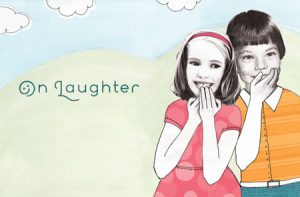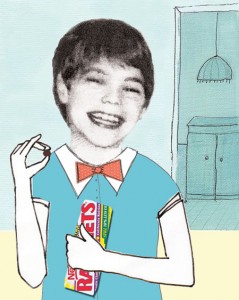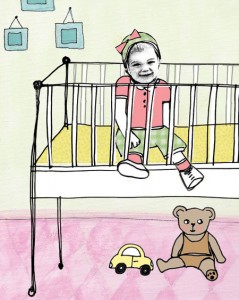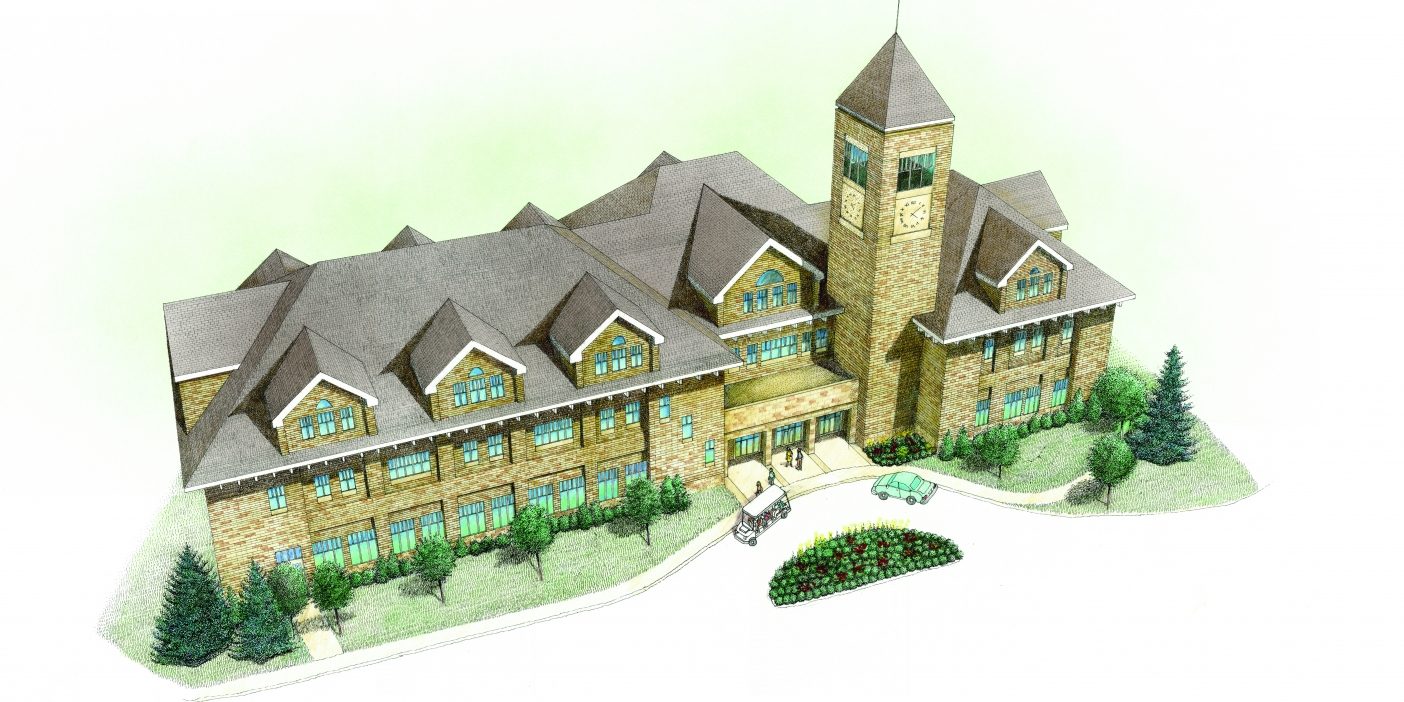A BYU professor shares sundry observations on the universal language of joy.
 A BYU professor shares sundry observations on the universal language of joy.
A BYU professor shares sundry observations on the universal language of joy.
As I write—not specifically now but generally in these days—my 2-and-a-half-month-old daughter is just beginning to laugh, and I am sharing in her joy, or, if it is not joy that she feels, still I feel the joy of her laugh. Infants can smile soon after they’re born; some pediatricians say that those fleeting moments are due to gasses or facial stretches or random chance, and don’t be fooled into thinking she’s really smiling. I don’t know about that. I don’t imagine anybody can say for sure. But now she is laughing, and I am sure.
She does not laugh only when we laugh; she is not only mimicking. And it is not because she is ticklish; I have tried that, and it doesn’t work. As far as I can tell, she is delighted by the world. She sees a funny face, sees her brother in a giant witch’s hat, sees me with my glasses on upside down, sees her mother dancing to the funky music of a commercial, and she laughs.
I have loved her since she was born—since before she was born, when she was only a concept to me, an idea—and yet I do not feel I knew her until now. Her laughter has become a common ground for us, a realization that the world is an interesting, silly place.
•••
A partial list of partial synonyms for laughter: cackle, chuckle, chortle, giggle, guffaw, snicker, snigger, titter, twitter. Had somebody, when I was younger, used the word titter, I can guarantee I would have tittered.
I have often heard the questionably accurate legend about the Eskimo, whose language includes dozens or hundreds of words for different kinds of snow, the lesson being that we invent words for the things we experience, the things we need to talk about. I consider it a good sign that we have so many words for laughter.
•••
Many things become laughable only in hindsight, after the emotion of the situation is placated and everything has turned out fine and we can reflect on our good fortune or our dumb luck. Such are my son’s many trips to the emergency room for foreign objects in his nose: partially chewed raisins, foam rubber, paper, the tip of a rubber snake’s tail. First were the raisins, which happened during my watch when I gave him chocolate-covered ones and left him alone. He sucked off all the chocolate, and—I can only imagine the rest—must have decided to store the unwanted raisins someplace out of the way. My mother has been telling me for as long as I can remember about the raisins I stuck up my nose when I was about my son’s same age. To see the genetic code replicate such a banal act is irony at its noblest. But I could not see it as I was struggling with my son under the strong light of the bathroom sink as he tried to break free of my hold as I tried to pull the desiccated, masticated grapes from his nostril. We ended up in the hospital then, as did my mother with me 26 years earlier, and returned the next day for a visit with the ear, nose, and throat specialist, who has since then become a sort of confidant, and whose staff laughs each time we return. “See,” I once overheard a nurse telling her coworker when she saw my son, “I told you it’d be him.”
•••
Laugh and the world laughs with you; he who laughs last laughs best; die laughing; laugh your head off; be the laughing stock of; laugh all the way to the bank; laughter is the best medicine; laugh up your sleeve.
I have tried to be thorough, even having discovered this last one, laugh up your sleeve, which I haven’t heard before and which derives from Renaissance times when sleeves were voluminous and available for storage and for hiding laughs, but there must certainly be more. Add your own laugh aphorism (laughorism?) in the space provided. Use the margins if necessary.
•••
The folk wisdom that laughter is the best medicine seems so ingrained in our culture that we believe it in spite of our science worship. We needn’t even see extreme examples of laughter-cured cancers or ulcers to know that a positive attitude can work wonders. We have seen it in our own lives.
Laughter is a form of internal jogging. It moves your internal organs around. It enhances respiration. It is an igniter of great expectations.
—Norman Cousins, Head First
Yet extreme cases do occur. In 1964 the late Norman Cousins, then editor of The Saturday Review, was stricken with a severe disease. Upset with inconsiderate hospital staff, unsanitary conditions, poor nutrition, and a generally depressing hospital environment, he sought ways to help his body heal itself. He researched heavily into the possible causes and cures for his disease and consulted with his doctor. Together, they reduced the amount of Cousins’ pain medication, increased his vitamin C, and (this was before the day of the VCR) got a projector and films of Candid Camera and several Marx Brothers movies. He also read from several humor anthologies. Soon, with massive vitamin C and laughter, he was out of the hospital and off drugs entirely. The effects of his disease receded rapidly. Eventually, he recovered almost fully, was able to go back to work, and could go about his daily life without pain (he says he could even play the Toccata and Fugue in D Minor, though a little more slowly than before). Although his method of recovery is debated as anything from miracle to placebo, he lived another quarter century, until age 75.
•••
 When you laugh, your body moves, your mouth forms a smile, your eyes squint, your nose wriggles. You may throw your head back, shake your head, bite your lower lip, get soda up your nose, close your eyes completely, start to tear, sniffle. Laughing feels good, mostly, and even uncontrollable, painful laughter, where your gut contorts and you can’t breathe, serves as a sort of anaerobic exercise. Usually accompanied by happiness, laughter causes an increase in happiness itself. It can even take you out of the doldrums and into—what’s the opposite of doldrums?—a hurricane of delight. Medical studies have shown that laughter increases the immune system’s activity and decreases stress-producing hormones while increasing good hormones such as endorphins. Cancer and heart patients at Loma Linda University’s medical center are treated with episodes of I Love Lucy and The Honeymooners along with their regular treatments. Laughter has been known to increase levels of disease-fighting T cells, the very cells killed off by AIDS. According to the experts, even fake laughter can sometimes produce these beneficial effects.
When you laugh, your body moves, your mouth forms a smile, your eyes squint, your nose wriggles. You may throw your head back, shake your head, bite your lower lip, get soda up your nose, close your eyes completely, start to tear, sniffle. Laughing feels good, mostly, and even uncontrollable, painful laughter, where your gut contorts and you can’t breathe, serves as a sort of anaerobic exercise. Usually accompanied by happiness, laughter causes an increase in happiness itself. It can even take you out of the doldrums and into—what’s the opposite of doldrums?—a hurricane of delight. Medical studies have shown that laughter increases the immune system’s activity and decreases stress-producing hormones while increasing good hormones such as endorphins. Cancer and heart patients at Loma Linda University’s medical center are treated with episodes of I Love Lucy and The Honeymooners along with their regular treatments. Laughter has been known to increase levels of disease-fighting T cells, the very cells killed off by AIDS. According to the experts, even fake laughter can sometimes produce these beneficial effects.
•••
Laughter can unite and comfort because in it people share understanding and happiness. In times of difficulty and sadness, laughter is often an important healer. It can lighten a heavy burden; it can change the flavor of tears. When our cat died after 19 years with us, my family was stricken with grief. The cat had been put to sleep at the veterinarian’s office, and my brothers drove to pick him up so we could bury him in our backyard. The veterinarian had stuffed the corpse in a thin plastic bag inside a Styrofoam cooler, which was set on the deck as my brothers dug a hole near the woods, one of the cat’s favorite haunts, where he had often hunted rabbits and birds and snakes. When the hole was almost finished, my mother and father came carrying the cooler, anxious to finish the burial before it got too dark. Everyone was crying silently, averting eyes and speaking in whispers. Because of the hushed silence, when the diggers took a short rest, my father assumed that the hole was finished and reached into the cooler and removed the bag. But the hole was still too shallow, and as my father made to deposit the cat’s body, my brother realized what was going on, calculated instantaneously, and shouted, “Wait! Don’t let the cat out of the bag!”
•••
Better of laughter than of tears to write,
For laughter is indeed to man unique.
—François Rabelais, Gargantua
This is debatable—the second part, that is. The hyena, coarse-haired scavenger of Africa’s savannah, is well known as a laugher because of its high, annoying what-is-it—a bark? a whimper? Monkeys scream out laughter-like sounds in the grasses and the trees of Africa, Asia, and South America. The “laughing jackass,” a midsized kingfisher bird native to Australia, makes a loud call that sounds similar to raucous laughter and that tormented early European explorers of that continent. You can hear its laughing call today in an inordinate number of jungle movies, whether or not they take place in Australia. Nowadays the bird prefers to be called by the more politically correct “kookaburra.” An old nursery rhyme goes:
Kookaburra sits in the old gum tree.
Merry, merry king of the bush is he.
Laugh, Kookaburra,
Laugh, Kookaburra,
Gay your life must be.
This, of course, allows a broad definition of laughter based not on humor but on the sound, the convulsion, the jiggling and giggling. But somebody sometime thought the sound alone was enough to qualify as laughter, thus we learn of the laughing frog (which is edible), the laughing bird (or green woodpecker), the laughing crow, the laughing dove, the laughing goose, the laughing gull, the laughing falcon, the laughing owl. And it’s not only animals that can laugh; in poetry brooks, fires, winds, valleys, fields, wine, seas, plateaus all can laugh as well.
•••
 With laughter, you often “had to be there.” Sometimes even if you weren’t there you laugh, but the effect wears off with repeated tellings so that, once again, “you had to be there.” I think this points to the difficulty of conveying real experience with language, to the weakness of imitation, as well as to the disparate range of our senses of humor. It means that laughter is often contagious, often set by a mood more than the joke itself or the situation, that experience is never cut off from the sum of prior and concurrent experiences.
With laughter, you often “had to be there.” Sometimes even if you weren’t there you laugh, but the effect wears off with repeated tellings so that, once again, “you had to be there.” I think this points to the difficulty of conveying real experience with language, to the weakness of imitation, as well as to the disparate range of our senses of humor. It means that laughter is often contagious, often set by a mood more than the joke itself or the situation, that experience is never cut off from the sum of prior and concurrent experiences.
From my youth, the funniest in my father’s repertoire of childhood stories was this: One day my grandfather bought some fruit trees to plant in the backyard. Among them was a pear tree, which he thought would soon bear fruit. But the pear tree was barren. In the first year, nothing. Likewise the second and the third. The family eventually gave up hope for fruit from the tree; at the same time they had grown rather fond of it. One afternoon my father, his father, and his brothers were tossing the football around in the backyard. Tom goes long for a pass, back to the corner with the pear tree, and when he misses the ball, he falls down flat on his back laughing uncontrollably and pointing to the branches. Everybody runs to him, curious to know why he’s laughing. When they ask him what’s up, he replies breathlessly, between convulsions of laughter, “There’s an apple on the pear tree!”
•••
And God said unto Abraham, As for Sarai thy wife, . . . I will bless her, and give thee a son also of her: yea, I will bless her, and she shall be a mother of nations; kings of people shall be of her. Then Abraham fell upon his face, and laughed.
—Genesis 17:15–17
In a Bible whose references to laughter mostly point to it as negative—laughing to scorn, the devil laughing—the story of Abraham’s reaction to God’s news is full of good laughs. I enjoy this passage of scripture, and the one immediately following where Sarah (formerly known as Sarai) also laughs at the prospect of bearing a child at her age (90, according to the record). I think it is because here God is so accessible, speaking to Abraham, straight-faced, telling him that he will have to put off his retirement plans to raise a child. The cause for laughter is the impossibility of the miracle, the weight of the responsibility if it’s true, the awakening to God’s ironic sense of humor, his special kind of love. It’s not easy being chosen, Abraham is beginning to see, and though we know there must have been a glitch somewhere in the translation, we can’t help noticing the pratfall; we imagine a dumbstruck Abraham, mouth agape, hair turned just a shade whiter, stumbling and falling as he reels from the news and falls upon his face. That the God-chosen name Isaac means “he laugheth” only heightens the comic effect.
•••
What is this strange relationship between laughter and misfortune? Where is the border between laughter and pity or worry? When a man trips and falls, is it always funny? Is it funny only if he is not hurt? When I was younger ABC introduced its sports programs with a montage of different athletic events and a narrator highlighting the action with general commentary about “The thrill of victory . . . and the agony of defeat.” And with this line the television showed a ski jumper precariously off balance on his way down the jump; then he falls and flops like a rag doll as he careens over the edge. I always laughed at that, but I wondered if I should. My father has since told me, without citing his sources, “That guy really got hurt,” and I feel almost guilty. What is it then? Disequilibrium? Strange poses? A sigh of relief that it happened to someone else?
At age 12, I am riding on some dirt mounds in a new development of houses near where we live. I’m on a Frankenstein bike that my friend John and I made from salvaged parts. It’s got springs under the vinyl seat and curvy touring-bike handlebars with white, hard plastic grips. I’m standing on the pedals, pumping hard to get up an especially steep mound, my thighs burning, arms taut, pulling back, and all of a sudden the grips come flying off the handlebars, simultaneously (I couldn’t believe it either), and I’m on my back in the dirt, legs tangled, bike on top of me, two white plastic grips still firmly in my grasp.
•••
Among those whom I like or admire, I can find no common denominator, but among those whom I love, I can; all of them make me laugh.
—W. H. Auden, The Dyer’s Hand
Laughter often breaks down social barriers, draws the curious gaze of the terminally aloof, perturbs the cool imperturbability and silence and feigned disinterest of strangers and passersby and commuters brought together only by their need for transportation. It sometimes allows, for a brief moment only, perhaps, a kind of communion. Laughter often forms its own ephemeral groups, united solely for the purpose of laughing, for a moment, before disbanding.
On a train from New York City to New Jersey, late afternoon, Fourth of July, heat hot, bodies tired from walking: My son can’t sit still. He can never sit still, but he is extra-antsy because of the heat, the enclosed space, the challenge of entertaining such a large crowd, who knows? The six of us—me, my wife, my son, my daughter, my father, my sister—have flipped the seat back of one three-seater and are facing each other on two benches as Pato, 2-and-a-half, jumps from one bench to the other, heedless, careless of who he kicks or who will catch him. We catch him. He jumps up, hanging from the overhead storage racks until his arms give, and I catch him. He clambers on the seat back, throws his grandfather’s hat, drops his crackers, says hello to the man and woman sitting behind us.
I pull him back down, whisper in his ear, plead with him to be still as he wriggles and twists.
He laughs, thinking I am trying to tickle him.
The woman behind ducks to where he can’t see her. He steps on my leg to peer over the edge of the seat. She jumps up and whispers, “Boo!”
He falls limp to the seat below, convulsing with laughter.
She does it again. He does it again. She does it again. He does it again. Laughter.
His sister, 5 months now and well-practiced in laughter, stares intently at her brother. Her eyes radiate something I want to call admiration. Each time he falls to the seat beside her, she laughs heartily, uncontrollably.
By now passengers in front of us are turning around, not only to watch, but to laugh. The woman behind us laughs as she peers around the side of our seat, as she varies her timing and sayings, making animal sounds and creaks. Pato roars like a dinosaur and jumps up and down hiding and seeking and laughing. Everyone in my family is laughing. My daughter now laughs when Pato falls, when he gets up, when he begins to climb. Her laughter is bright and clear and pure and unselfconscious, and I understand why a cool mountain brook might be said to laugh.
People behind us are sitting up tall in their seats to see the commotion. Some are standing, watching the tireless boy and asking to see the beautiful little girl who is laughing. They laugh with him as they are entertained by his antics. They laugh with her as they are infected by her wonder. “Is that her?” someone asks. “What a beautiful girl,” says another. Across the aisle a teenage girl makes faces and laughs. “Quack quack,” says the woman behind.
Pato (whose full name is Patrick, whose mother, who speaks Spanish, nicknamed him Patito—little Pat—to distinguish him from me and my father and grandfather, who then shortened the name to Pato) means, in Spanish, “duck.”
•••
The word laughter is like any word; if you say it enough, it begins to sound strange and wondrous. Listen to the sound as it separates from meaning; hear its similarities to other words, its complete uniqueness; feel your tongue pull away from the back of your front teeth, your bottom lip bitten slightly as the air escapes out the sides of your mouth; a quick strike of the tongue, like spitting; cut the air somewhere back of the mouth, in the throat, almost like a vowel, a sound foreigners have difficulty making. It is enough, sometimes, if you say it fast enough long enough, to make you laugh.
•••
In English laughter as dialogue is most often portrayed as something like ha ha ha. There are exceptions; for instance, Santa Claus’s laugh is ho ho ho. This is also the laugh of the Green Giant (of canned and frozen vegetable fame). Little people with high voices laugh hee hee hee, sometimes beginning with a tee. Connivers or old men or half-laughers do it heh heh heh. In Spanish the laugh is represented the same way. Though they are spelled differently, laughs like ja ja ja, jo jo jo, ji ji ji, and je je je all sound the same as do our laughs in English. The same holds true for laughs in Romanian, French, Japanese, and Chinese, and I’d be willing to bet it’s the same in most other languages, too: always a vowel sound introduced by an h, the sound closest to breathing, as if laughter were as basic as respiration.
•••
Only the emotion of love takes higher rank than the emotion of laughter.
—Max Beerbohm, “Laughter”
As I write—now, in this moment—I can hear my daughter’s muted laughter behind me. She is lying in bed, sucking on her whole hand, eyes bright with the morning sun through the window, and she is laughing. It is not clear to me what she is laughing about, but that laughter without motive is beautiful. I listen closely, watching her, and I laugh out loud.
Patrick Madden is an assistant professor of English. Another version of this essay was selected for inclusion in The Best American Spiritual Writing 2007.
Click to download an audio file of this essay.
Feedback: Send comments on this article to magazine@byu.edu.









